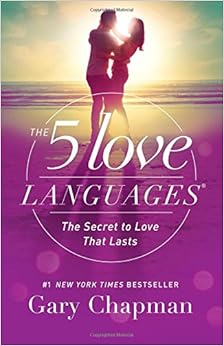Long referenced in sermons, marriage counseling, dating situations, and general conversation, this book is one I have intended to get around to for a while. The problem is that I could not get it from the library, and I didn't want to put forth the money to buy it. I'd taken the test; I sort of knew where I fell. I understood the concepts. I wasn't sure the book would offer me that much more insight. And really, it did not, though I appreciate that my wife spent the money to buy it for me, and it was a fun read.
That said, I felt as if the book could have been summarized in a twenty-page paper or so, but to fill out the text and sell it, the author added a number of anecdotes. Anecdotes aren't bad, but for me to feel the gravitas of the text, I would have preferred something a bit more analytical--surveys and tests that would more scientifically back up the author's claims.
Still, as a professional marriage counselor, the author has a lot of experience to offer--and I'm sure that his insight into the love languages has paid dividends that show the absolute usefulness of the theory. I myself can see its usefulness, just in the little I have learned.
As self-help-type books are prone to do, however, this one seems so centered on its theory that a reader is made to feel as if the main cause of marriage unhappiness is a lack of speaking the same love language and that by mastering this one thing, we can bring back the love. Important, no doubt, but the work comes across as simplistic--probably more than the author intends.
The five languages are acts of service, quality time, gifts, physical touch, and affirmative words. Each person uses primarily one or two of these languages. Relationships often fall apart, according to the author, after the initial euphoria, because the two people aren't speaking the same love language. Mastering the other person's love language can reap dividends for restoring the relationship.
The author claims that we give and receive in the same love language. That's something I have wondered about--whether that is necessarily so. He also claims that we have the same love language throughout life, which is something I'm also uncertain about. I think one's love language can depend greatly upon the situation. Why? Because when I took the book's test as a single I had differing results from when I took it as a married person. And in fact, some questions on the test were hard for me to answer, as the answer would greatly depend on my mood.
As a single I tested for quality time and affirmative words. As a married person I tested for quality time and acts of service. I've always felt more comfortable showing love by doing things for others, but I don't find that such acts always make me feel closer to another person. Still, this time around, I realized that things my wife does for me are probably appreciated by me more than most other things she can give me.
Words were important to me as a single but less so as a married person. I'd say that this is probably because I have a tank that needs to be filled up with each language, and as a single, that tank was less often full. As a married person, my wife constantly says nice things, so I don't end up appreciating them as much as I did when those nice things were rare gems.
The same can go for quality time, once extremely important. It's still important for me. But I remember as a single how four to eight hours with a person in a given week was often enough to fill up my tank; however, I rarely got those hours from a person. Now, again, that tank is usually full, so I end up appreciating time together less that I would. (With my wife off at grad school, however, time is much more appreciated again than when we were living together.)
Touch--I don't particularly like touching strangers or like being touched. But my mate? My lover? That's different. It rates highly now, whereas it barely registered when I was single.
What I'm saying is that it seems to me that how love is shown to us and what we need, or feel a lack of, with regard to how it is demonstrated seems to me contextual. Time seems more important when it is harder to get and give; touch seems more important when it is possible to get and give; and so on.
All that said, I'm left feeling a bit daunted by the tasks before me: showing more love to my wife. Her languages seem centered on all five. I really don't know where to concentrate--but I do know that I come up short on words and gifts, which tend to be my weakest areas for showing love. More work to do.
Tuesday, February 16, 2016
On "The Five Love Languages" by Gary Chapman ****
Labels:
Books,
Four-Star Nonfiction,
Gary Chapman,
Nonfiction
Subscribe to:
Post Comments (Atom)







No comments:
Post a Comment